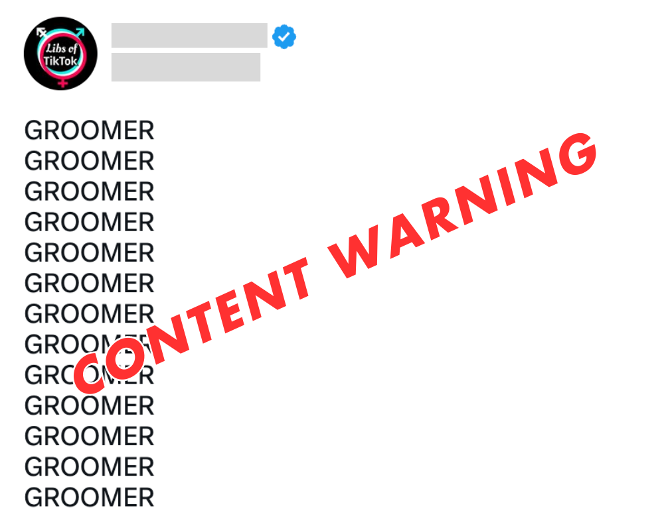Online Anti-LGBTQ Hate Terms Defined: “Groomer”
This entry is part of the GLAAD Guide to Anti-LGBTQ Online Hate and Disinformation, an ongoing project to identify some of the most prevalent and egregious terms, tropes, and concepts that are used to harass, attack, and spread malicious misinformation about LGBTQ people on social media. Learn more here.
*CONTENT WARNING*
The example below includes a hateful term, phrases and imagery.
“Groomer”

The anti-LGBTQ “groomer” trope (and similar baseless and dangerous rhetoric falsely asserting that LGBTQ people are pedophiles, sexual predators, and threats to children) is dangerous hate speech which has been popularized to foment fear and hatred, and ultimately violence, against LGBTQ people — specifically targeting them in direct violation of the hate speech policies of all social media platforms.
In recent years the term “groomer” has been widely used by far-right figures as an anti-LGBTQ slur. In March 2020, a 4chan thread had urged trolls to reply to tweets from LGBTQ people with “OK groomer,” as a play on the “OK boomer” meme, Harvard Cyberlaw Clinic instructor Alejandra Caraballo writes. A variety of prominent alt-right and anti-LGBTQ accounts, including Jack Posobiec, James Lindsay, Libs of TikTok, and Ben Shapiro, subsequently began popularizing the “groomer” trope. In July 2022 multiple platforms including Meta, TikTok and Reddit issued public statements proclaiming that use of the term as an anti-LGBTQ slur was in violation of their hate speech policies; in 2022-2023, multiple companies including TikTok, Google, PayPal, Venmo, Wix, Printful and others have suspended social media accounts perpetuating the trope for being in violation of their hate speech policies. As a 2023 Institute for Strategic Dialogue (ISD) Global report summarizes: “Around the world today, the use of the term ‘groomer’ is used to justify hate, discrimination and violence against the LGBTQ+ community. In the US particularly, the use of this language, along with conspiratorial thinking around queer people, has led to legislation preventing the discussion of LGBTQ+ issues in schools and preventing trans children from accessing gender affirming healthcare, and has motivated attacks on LGBTQ+ individuals.”
Right-wing extremists have long propagated the term, but in recent years, it has become a mainstream conservative talking point and has been weaponized by politicians such as Marjorie Taylor Greene and Ron DeSantis. ISD further explains: “Part of the success of this mainstreaming lies in the ability of fringe actors to manipulate the general public’s lack of knowledge of queer culture and particularly their insensitivity to the plight of trans people. This has been coupled with the most potent fear — that of people harming children, which has been used to justify hatred and irrationality for centuries.” Explore more via GLAAD’s Guide to Anti-LGBTQ Online Hate and Disinformation.
Conclusion
This is just one example of anti-LGBTQ online hate and disinformation. Every term and concept should be evaluated in context. For instance, LGBTQ people and allies may use hashtags with hate terms as counterspeech, or slurs such as “tranny” or “dyke” may be used self-referentially to reclaim them. This guide will be updated on an ongoing basis. Please see the latest GLAAD Social Media Safety Index report for a deeper exploration of the current social media landscape for LGBTQ people, including GLAAD’s recommendations and thought leadership in the field.
How to Report Anti-LGBTQ Online Hate Speech and Harassment
Every major social media platform has policies which prohibit hate and harassment on the basis of protected characteristics, including sexual orientation and gender identity. To learn how to report potentially violative content, check out GLAAD’s LGBTQ Digital Safety Guide, which includes basic tips on helping our community be more safe online.
About the GLAAD Social Media Safety Program
As the leading national LGBTQ media advocacy organization, GLAAD is working every day to hold tech companies and social media platforms accountable and to secure safe online spaces for LGBTQ people. The GLAAD Social Media Safety Program produces the highly-respected annual Social Media Safety Index (SMSI) and researches, monitors, and reports on a variety of issues facing LGBTQ social media users — with a focus on safety, privacy, and expression.












